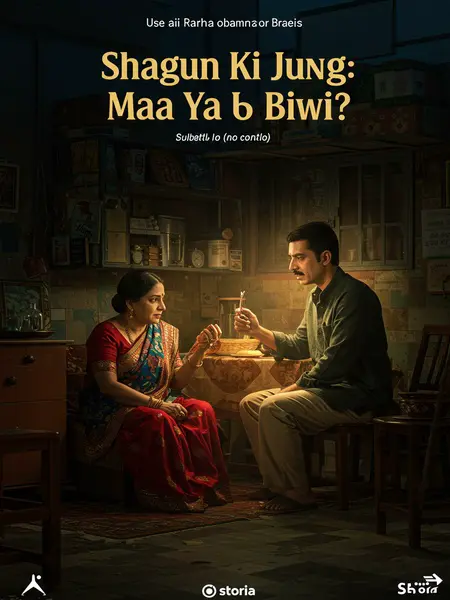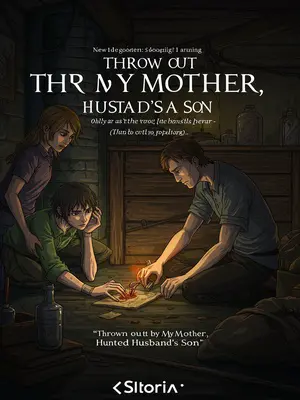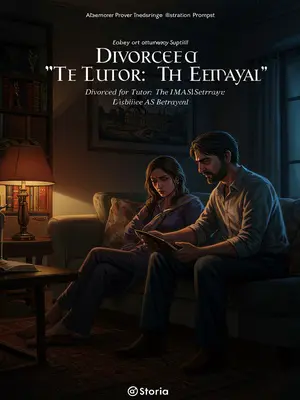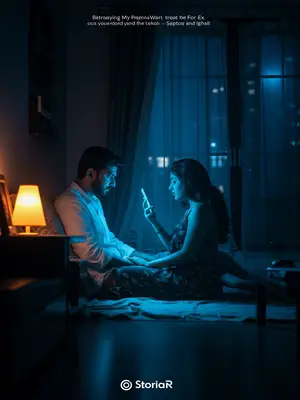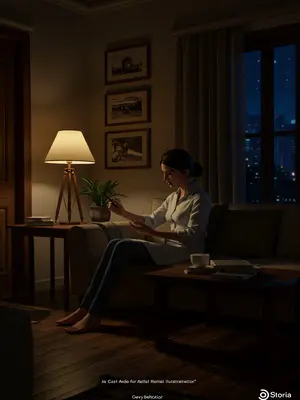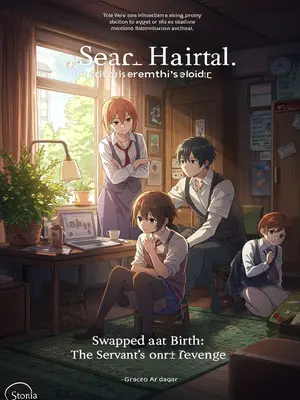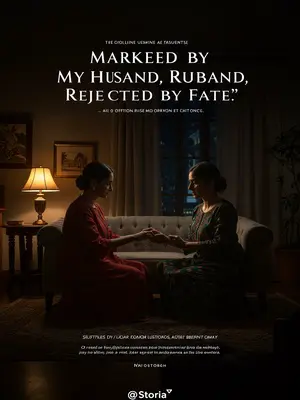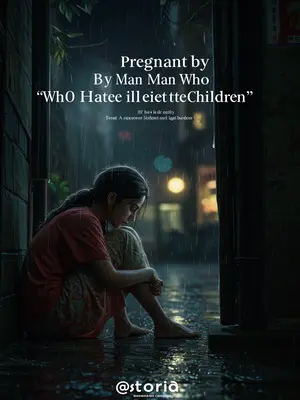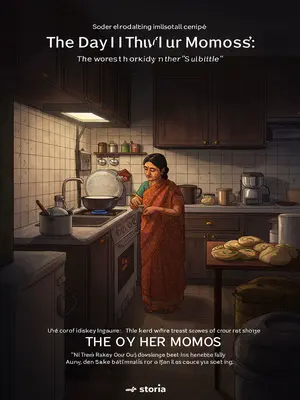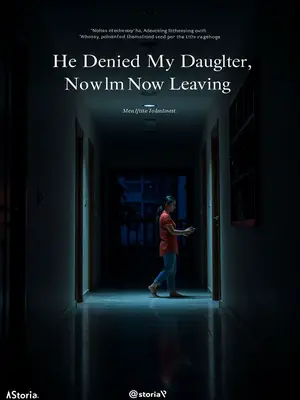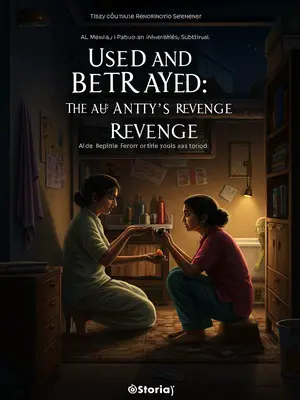Chapter 1: The Midnight Call
It was past midnight when my phone vibrated on the side table, its harsh buzz cutting through the sticky Delhi night. Uncle Prakash’s name flashed on the screen. My vest clung to my back, the ceiling fan spinning lazily above, but a cold shiver ran down my spine. His voice, tight and urgent, crackled over the line: "Beta, Sunita ka accident ho gaya. Jaldi hospital aa jao, paise leke. Turant chahiye."
The fan whirred overhead, but it felt like the air had thickened. I could hear distant horns on Ring Road, a faint cricket commentary from the neighbour’s TV. My heart hammered in my chest. Time seemed to pause, every second stretching out as I tried to make sense of his words.
I spun around to Priya, panic rising in my throat. "Mummy ko accident ho gaya hai. Paise toh ghar pe nahi hain. Let’s use your shagun money, na—just as an advance, we’ll manage later."
My words stumbled out, my mouth dry. In my mind, I saw the red-and-gold envelope tucked away in the Godrej locker—the crisp notes from the wedding, untouched, still holding a faint whiff of haldi and incense.
Priya’s eyes snapped open, her face tightening. "Bilkul nahi! Agar tumhari mummy hospital mein hain, toh main apna shagun kyun doon? Apne relatives se udhaar le lo."
Her voice was sharp, her eyes flicking up to the Lakshmi photo above the cupboard. She wrapped her dupatta tightly around herself, sitting up in bed, lips pressed into a hard line. The idea of using the shagun seemed to sting her, as if I’d suggested burning her wedding sari.
I stared at her, stunned. I searched her face for some sign of softness, but she was unmoved. Even the glow from her phone couldn’t melt the sudden chill between us.
"Ek zindagi daav pe lagi hai, aur tum abhi bhi apne shagun pe atki ho?" I managed, my voice trembling. I remembered Amma’s old brass lota—how in my family, we’d pawn even that if someone needed help.
She rolled her eyes, voice biting. "Toh likh kar de. Jo paise use karega, baad mein wapas karega. Promissory note bana le."
She flicked her hair off her forehead, her gaze challenging. The dressing table, with its pile of wedding cards and scattered bangles, seemed to mock the vows we’d exchanged not so long ago.
I was speechless. My mind reeled. How had it come to this—fighting over money, with Mummy in a hospital bed? I glanced at the wall clock—1:37 AM. The whole colony was silent, but inside our flat, everything was boiling over.
That shagun was from my side of the family, and now, to use it for her mother, I’d have to sign a note?
Images from our wedding flickered in my mind—Amma, beaming in her Kanjivaram, slipping the envelope to Priya’s mum. That envelope now stood between us, a barricade made of pride and suspicion.
Priya wasn’t budging. She stormed off to the study, her payal jingling against the tiles. "Likh do—‘borrowed my money for hospital treatment, promise to return’—warna kuch nahi milega."
She rummaged through the drawer, tossing aside old LIC policies and electricity bills, finally pulling out a notepad. Her movements were precise, businesslike—the room thick with the scent of old paper and new resentment.
I tried to reason, my voice shaking. "Yeh toh hamari maa hai, Priya. Family hai hum log. Scene mat banao, please."
In my head, my father’s words echoed: "Beta, parivaar ka matlab hai dukh-sukh baantna." The room felt stifling, as if every photo frame on the wall was judging us.
Priya cut me off, her tone agitated. "Tum hi toh hungama kar rahe ho! Shagun mere security ke liye diya tha tumhare ghar ne. Ab kuch ho gaya toh tum seedha ussi pe haath maar rahe ho? Kya guarantee hai wapas karoge? Sacchi mein care karte ho toh apne rishtedaaron se paise le aate, mere shagun ko seedha kyun dekh rahe ho?"
Her voice rose, sharp as the pressure cooker whistle from the kitchen. She clutched the notepad tight, her knuckles white, every word another brick in the wall between us.
I couldn’t wrap my head around it. "Priya, tumhari hi maa hai. Itna dil kaise sakht ho sakta hai?"
I remembered her crying into her mother’s sari pallu at her vidai. That memory stung, the word ‘heartless’ hanging heavy in the silence.
Suddenly, Priya’s eyes filled with tears. She bit her lip, a tear splashing onto the notepad. She wiped it away, angry at herself for showing any weakness. Moonlight shimmered on her cheeks.
Her voice shook. "Ab emotional blackmail karoge? Tumne shuru se hi mujhe yeh choice di—zindagi aur shagun ka. Tumhare itne rishtedaar hain, unse le lo, ya likh ke de do, bas."
She hugged the notepad to her chest, blinking rapidly, as if she could erase the moment if she just tried hard enough.
My anger flared. "Main IOU kyun likhu?"
My fists clenched, nails digging into my palms. I stared at the chipped tile near the bed, not daring to meet her eyes. My ears burned with humiliation.
Priya fired back, "Toh dad se likhwa lo! Apne biwi ka shagun use karna hai toh likh ke de. Kya uske liye bhi main responsible hoon?"
She folded her arms, her chin jutting out. The issue was no longer about Mummy in the hospital; it was about pride, about who would bow first.
I forced myself to stay calm. "Theek hai, tum likh do pehle. Hospital pahunchte hi dad se sign karwa lunga."
Every word was clipped, my hands shaking as I fumbled for my wallet. In my heart, I begged Bhagwan to help me hold it together.
Priya nodded, finally satisfied. She uncapped her pen, her strokes deliberate as she started writing. The clock’s ticking felt like a countdown. Outside, the rickshaw stand was silent, but inside our flat, a family was coming undone.
Just as she finished, Uncle Prakash’s call came again. The ringtone—a '90s filmi song—was jarring in the tense silence. Priya’s hand jerked, smudging the ink.
I picked up. Uncle Prakash sounded even more frantic: "Paise kahan hain? Jaldi kuch lakh bhej do!"
I could hear the chaos of the hospital behind him—nurses calling out, machines beeping, someone coughing. My own panic doubled. I wiped my face with my gamcha, sweat already pooling on my forehead.
I turned to Priya. "Bohot urgent hai. Tum transfer kar do, please. Tumhare paas kuch savings hain na?"
I tried to sound calm, but my voice cracked. My palms were slick, Amma’s words ringing in my head: "Beta, kal pe mat chhodo jab kisi ko madad chahiye."
Priya snapped, "Nahin! Pehle sign karo. Kya pata, baad mein paisa wapas na mile."
She clutched her phone, thumb hovering above the UPI app but refusing to budge. Her eyes met mine, steely and unyielding.
Uncle Prakash must have overheard. Silence hung on the line, broken only by the hospital TV in the background. I imagined him staring at the phone, shocked.
He asked, voice trembling, "Yeh meri beti bol rahi hai? Paise wapas karne ki baat? Yeh kya ho gaya hai?"
His disbelief was palpable, the sort that shakes the foundation of a family. The word ‘promissory note’ sounded so out of place—here, family meant trust, not paperwork.
I said quietly, "Uncle, please gussa mat ho. Priya likh rahi hai promissory note. Use darr hai ki aap paise wapas nahi doge."
My words tasted like shame. I felt exposed, as if the entire mohalla was watching our family drama unfold.
Uncle Prakash couldn’t believe it. "Har second keemat ka hai, aur tum log abhi bhi likh rahe ho promissory note?"
His voice cracked. I could hear the heartbreak in it—the kind that only comes when your own blood lets you down.
I said, "Haan Uncle, aapko sign karna padega, tabhi Priya paise transfer karegi."
I stared at the floor, unable to look at Priya. Outside, the street noises drifted in, mocking our helplessness. My chest felt like it was being squeezed in a vice.
Then Uncle Prakash lost it. His voice rose, shaking. "Yeh ladki hai ya pathar? Zindagi aur maut ka sawaal hai, aur yeh...!"
His words echoed through the phone, the kind that reverberate through family gatherings and linger for years. Even Priya heard.
Priya stopped writing, stormed over, snatched the phone from me, and shouted, "Kisey bol rahe ho? Besharam buddha, apni biwi ka bill tak nahi bhar sakte, aur mujhe sunate ho? Main kuch nahi dungi!"
Her voice cracked through the night, loud enough to wake the neighbours. Her eyes blazed, hands shaking as she flung the phone down.
The phone hit the floor with a sickening crack. For a second, time stood still—the TV next door, the barking street dog, even my own breath seemed to stop.
I dropped to my knees, muttering curses. The screen was shattered, the phone dead. It felt like everything—love, trust, family—had broken with it.
Priya shook with rage. "Woh buddha mujhe sunata hai! Uski awaaz toh pura drama villain lagti hai."
Her words spat out, her breath coming in angry bursts. She looked ready to take on the whole world.
Just then, her own phone rang, the shrill ringtone slicing through the tension. She glanced at the screen, blue light throwing her sharp features into relief. The contact name—Dad—flashed. We exchanged a look: here comes the next round.
She picked up, sneering, "Abhi bhi sunana hai kya?"
Her voice was icy, a dangerous whisper. She jabbed decline, sending the call straight to voicemail.
She turned to me, voice cold. "Unhone pehle mujhe sunaya. Main kuch nahi dungi. Apne relatives se le lo. Mere shagun ko haath mat lagana."
She slipped her phone into her kurta pocket, shutting me out. The silence in the room pressed down like the air before a thunderstorm.
